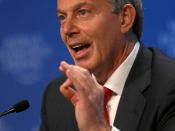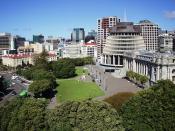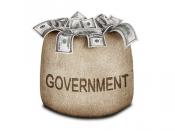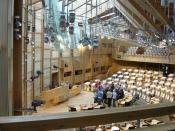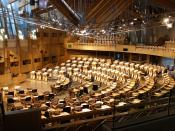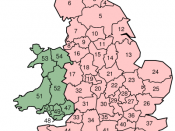When a major issue is needed to be tackled within the UK, and only the Government at the time are able to make the yes/no decision, we in the UK have a voting system in place to deal with this. This is known as Referenda. The official dictionary definition of Referenda states that ÃÂÃÂ noun (pl. referendums or referenda /reff rend /) a general vote by the electorate on a single political question which has been referred to them for a direct decision.ÃÂ (Oxford English Dictionary 2007). This definition can be interpreted as a form of direct Democracy. Usually the issues for holding a Constitutional Referendum equate to major issues such as passing new laws, or a specific government policy. This means the Constitutional Referenda is a rare event within the United Kingdom.
There are only two types of Referenda used in the United Kingdom. We have Pre - Legistlative & Post ÃÂ Legistlative.
As a Referendum is NOT legally binding, the current appointed Government do have the option to ignore the results if they see fit. Also, due to the Local Government Act 1972, small communities may call a meeting and if necessary the local council must have called a referendum within 14 ÃÂ 25 days. This does not make the referendum legally binding, but it can possibly lead to being influential (Wikipedia 2007).
It can be said that the Referendum helps to strengthen Democracy by allowing the public to participate in the Government decisions, and ensure that people feel as thought they have some power over the way those decisions are made. Referendums are also very advantageous as they set out to enlighten and educate the public on individual issues. This enables people to still feel involved and voice an opinion especially in the decline of the turnout of voters.
ReferendaÃÂs, whilst very rare, have been around within the UK Government since the Local Government Act 1972, and only one has been held to cover the whole of the United Kingdom. This was the United Kingdom Referendum 1975. This was a post-legislative referendum to decide if there was enough support for the UK to stay within the EEC. This resulted with the UK staying within the EEC, however we can look at this sceptically as the Referendum was part of a pledge if Howard Wilson came to power with the Labour Party. He was elected in February 1974 and set about ensuring the Referendum was called as soon as possible, however controversially, Wilson was in ÃÂYesÃÂ party along with the majority of the Conservative Party. The majority of Wilsons Labour Party strongly opposed the UK staying within the EEC. (BBC News ÃÂ 06/06).
This use of the Referenda to involve the whole of the UK worked well as the general public felt involved with the Government.
On a national scale, effective Referenda are few and far between due to their rarity, however many local councils hold Referenda on a more regular basis. A stellar example of effective Referendum is the 1998 Milton Keynes Referenda. This was held to help people to decide on what level of taxation was wanted within Milton Keynes. Not only was this largely successful due to the turnout of voters of 44.7%, it was historic as Milton Keynes was the first UK council to hold a local Referendum (Laria ÃÂ 1999)Scotland also had a regional Referendum with regards to devolution in September 1997. This was phenomenally successful given the fact that it was the second Referendum for the same issue. A staggering 74% of Scottish people voted ÃÂyesÃÂ to having a Scottish Parliament. This was a manifesto commitment from the Labour Party to Scotland as they were in favour of the separate Parliament. Almost immediately after the yes vote, the Scottish Parliament Act 1998 was passed, making this an extremely successful Referendum (Scottish Parliament ÃÂ 1999)However whilst there are a number of success stories, support for Referenda is very small. Referenda are inconsistent with the belief in parliamentary sovereignty. Many people feel that due to their being no specific procedures to prompt a Referendum until the year 2000 (The Political Parties, Elections and Referendums Act 2000) the Government seemed to only call for them in the certainness of a win. A more recent example is the European Treaty. The Media can also influence the outcome under pressure from the Government allowing there to be no ÃÂNeutral ParticipantsÃÂ. It also allows Politicians to offload decision making.
All of this leads to the fact that Referenda are even scarcer in todayÃÂs Britain. With the topical issue of the European Treaty highly prioritised in todayÃÂs media, the French President, Nikolas Sarkozy has recently described Referenda as ÃÂDangerousÃÂ. He feels that if a Referendum is called for the recent issue of the new European Treaty, the results would be ÃÂLost in France, Britain and other countriesÃÂ. Sarkozys comments have led to speculation that the governments are delaying the referendum because they cannot force a vote in favour of the Treaty. (The Daily Telegraph, 14/11/2007). This feeling is echoed in the United Kingdom as a recent article in The Guardian Newspaper has proved. Timothy Ash has quite cleverly hit the nail on the head ÃÂ ÃÂIf we had a referendum, the government would lose it.ÃÂ (The Guardian 11/10/2007). If this is the case, then surely it can be argued that instead of forcing a vote of a minority of electorates, it would be better to open the vote to the nations, as this is a decision that should concern every individual voter? If the Labour Party is so concerned with losing, then surely they should take the campaign to higher levels and show the public the good intentions behind the Treaty instead of trying to change the Treaty to avoid the Referendum?Sometimes some decisions should not be made by the public as they do not possess enough knowledge to make an informed decision. A perfect example of this would be the decision made by Tony Blair and George Bush to go to war with Iraq post 9-11. Whilst it has since been deemed a bad decision by both Mr Blair and Mr Bush due to them being privy to information that has now been proved as false, these prominent people had access to documents that due to the nature and content, the public were not able to see. If a Referendum had been called to see if the UK backed the decision to go to war, not only would the Government have lost, they would have also not been able to initially shut down the main areas of the Taliban and also stop any further terrorist attacks happening. This also led to the capture and death of Saddam Hussain (Wikipedia 2007).
After looking at all angles of the Referenda, it can be argued that whilst on a regional scale Referenda are extremely successful in including members of the communities in the local Governments decisions and should be used more on this scale, nationally Referenda should be used sparingly. Whilst they are important to ensue the publics own opinions and wishes are voiced, we have politicians for a reason. They are elected because the public put them in their faith that they will be able to confidently make the big decisions. If a decision cannot be made by politicians, should we not be looking into ensuring we have a Government we can trust implicitly and not be handing over the main decisions to the public? Before the Labour Party came into power, Referendums were used very rarely yet since 1997 we have had five referendums on devolution, with more in the pipeline (Wikipedia 2007). Is Labour trying to include the public as a ploy to gain more electoral seats or are they so unconfident in their own power that they feel the need to step back? It seems until we have a Government body that trust in their own decisions whole-heartedly, we will be subject to more and more Referenda.
BibliographyBooks1 - The Electoral System in Britain (Robert Blackburn 1995 ÃÂ Pages 424, 425-7)Websites1 ÃÂ http://en.wikipedia.org/wiki/Referendums_in_the_United_Kingdom (Wikipedia, URL Accessed 26/11/2007)2 - http://www.askoxford.com/results/?view=dict&freesearch=referenda&branch=13842570&textsearchtype=exact (Oxford English Dictionary, URL accessed 26/11/2007)3 - http://www.swarb.co.uk/acts/1972Local_GovernmentAct.shtml (Swarb, URL accessed 4/12/2007)4 ÃÂ http://www.telegraph.co.uk/news/main.jhtml?view=BLOGDETAIL&grid=F11&blog=yourview&xml=/news/2007/11/14/view14.xml (The Daily Telegraph 14/11/2007 - URL accessed 27/11/2007)5 - http://news.bbc.co.uk/onthisday/hi/dates/stories/june/6/newsid_2499000/2499297.stm (BBC News 06/06 - URL accessed 27/11/2007)6 - http://www.guardian.co.uk/Columnists/Column/0,,2188365,00.html (The Guardian 11/10/2007 ÃÂ URL accessed 4/12/2007)7 - http://www.tutor2u.net/politics/content/topics/elections/referendum_arguments.htm (Tutor2u URL accessed 4/12/2007)8 - http://www.opsi.gov.uk/acts/acts2000/20000041.htm (Official Office of Public Sector Information ÃÂ URL accessed 04/12/2007)9 - http://www.laria.gov.uk/content/features/60/feat6.htm (Laria - URL accessed 04/12/2007)10 - http://www.scottish.parliament.uk/vli/history/pathtodevolution/index.htm (Scottish Parliament - URL accessed 04/12/2007)11 - http://en.wikipedia.org/wiki/George_w_bush (Wikipedia - URL accessed 04/12/2007)
